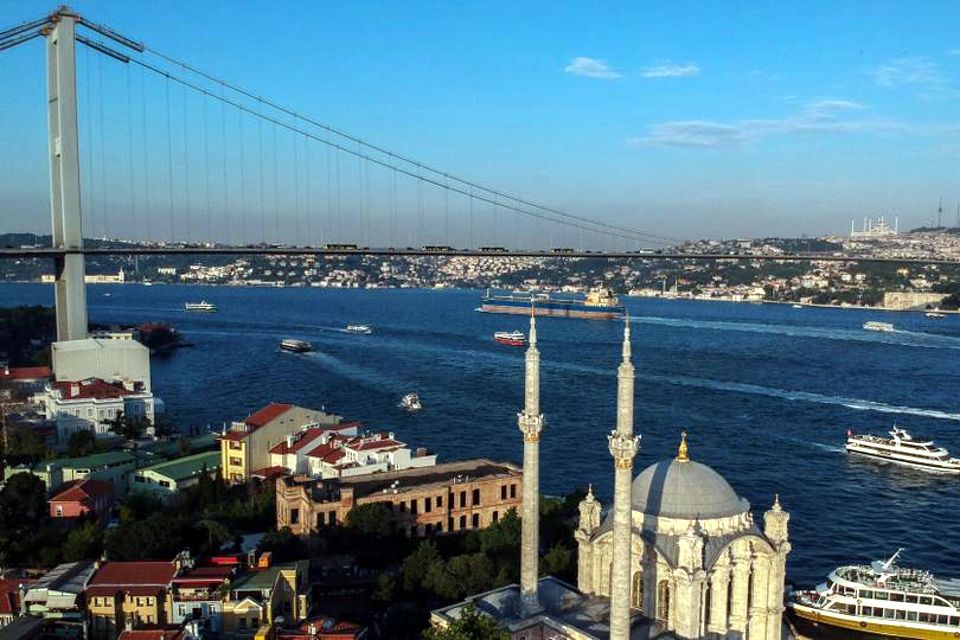 Bosphorus Bridge (AP)
Bosphorus Bridge (AP)
Bosphorus
“Whenever I find myself talking of the beauty and the poetry of the Bosphorus and Istanbul’s dark streets, a voice inside me warns against exaggeration, a tendency perhaps motivated by a wish not to acknowledge the lack of beauty in my own life. If I see my city as beautiful and bewitching, then my life must be so too.” — Orhan Pamuk
Turkey is a country that occupies a unique geographic position, lying partly in Asia and partly in Europe. The Bosphorus, a storied strait, cuts through it and proudly welcomes everyone who visits Istanbul, as it brags about the Ottoman palaces, fortresses, old wooden villas, hotels, parks and gardens, restaurants, cafeterias, and fine neighborhoods that align it. The Bosphorus in itself is already a sight to behold, but Istanbul, with its mosques and Grand Bazaars, is much more.
Aware of his fondness and partiality for his hometown, Ferit Orhan Pamuk, a Turkish novelist, screenwriter, academic, and recipient of the 2006 Nobel Prize in Literature, checks for exaggerations in writing. Amidst this poetic admission, he remains one of Turkey’s most prominent novelists, whose work has sold over thirteen million books in sixty-three languages, making him the country’s best-selling writer.
Likewise, the bible is full of exaggerations, even more, yet rightly so, as narrations of miracles abound. Exaggerations befit God by simply Being.
The Stanford Encyclopedia of Philosophy defines a miracle (from the Latin mirari, to wonder) as “an event that is not explicable by natural causes alone. A reported miracle excites wonder because it appears to require, as its cause, something beyond the reach of human action and natural causes.”
Every miracle then is an exaggeration (from the Latin exaggeratus, past participle of exaggerare “to heap up, construct by piling up, increase in significance”), a piling up of observations that defy natural cause.
Besides the Resurrection of Christ, the miracle that stands out brightest in the bible is the birth of a Child from a Virgin in Bethlehem. A light appeared and conquered the Darkness that engulfed the whole world, and this was made visible even to kings from afar. “Men of wealth, sages from afar…. they set out on the long and perilous journey that would lead them to Bethlehem… Kneeling before him, they understand that the God who with sovereign wisdom guides the course of the stars also guides the course of history.” (Francis, Admirabile Signum)
As Saint Paul said to those listening to him in Athens on the Areopagus: in him, we live and move and have our being (Acts 17:28). Therefore, “in the Judeo-Christian tradition, the word ‘creation’ has a broader meaning than ‘nature,’ for it has to do with God’s loving plan in which every creature has its own value and significance. (Francis, Laudato Si, 76)
Clearly, the narrations of history may come in broad strokes, but these may also address particulars and particularities of individual life stories. And the life of a billion individuals may record a billion blessings, some big, some small.
It is sometimes said that “we live by a miracle,” to refer to the surprising ways in which certain problems or dangers are solved. In reality, the expression contains a radical truth: every moment of our ordinary life unfolds in the midst of the miracle of a world that exists out of love. “Each one of us, each man and each woman, is a miracle of God, is wanted by him and is personally known by him.” (Benedict XVI, Audience, 23 May 2012)
May the continuing Christmas season and the start of the new year provide us moments to sit, reflect, and acknowledge these miracles. (Honey Libertine Achanzar-Labor, PhD)


No Comments